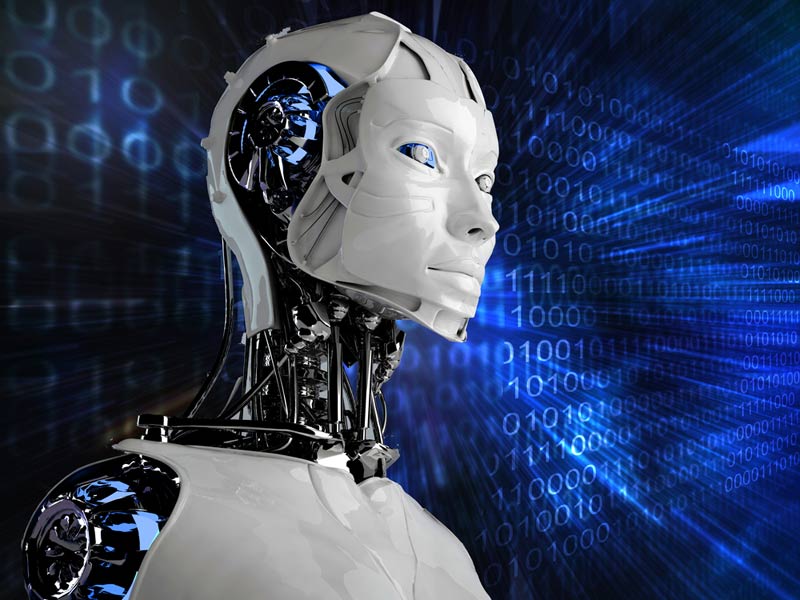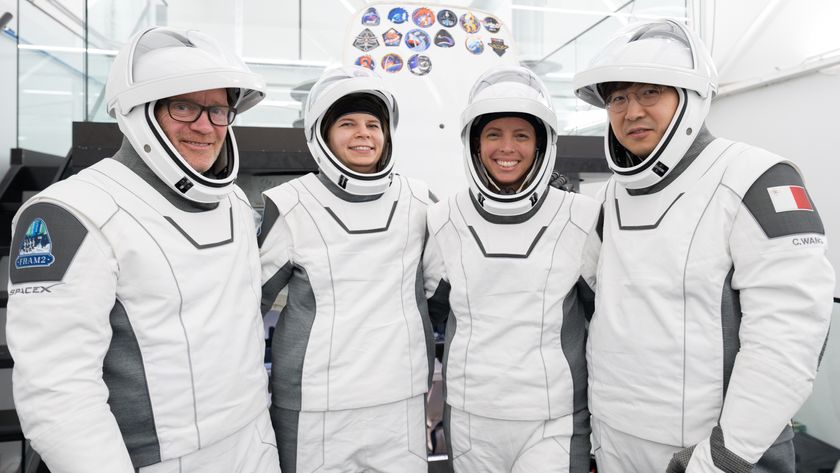
Brains, Minds, AI, God: Marvin Minsky Thought Like No One Else (Tribute)

Robert Lawrence Kuhn is the creator, writer and host of "Closer to Truth," a public television series and online resource that features the world's leading thinkers exploring humanity's deepest questions (Peter Getzels, producer/director). Kuhn contributed this article to Space.com's Expert Voices: Op-Ed & Insights.
Artificial intelligence (AI) pervades people's lives today, from smartphones and search engines to transportation systems and medical diagnoses. One of AI's legendary pioneers, Marvin Minsky, co-founder of what is now the Computer Science and Artificial Intelligence Laboratory at the Massachusetts Institute of Technology and considered to be the "father of AI," died on Jan. 24, 2016, at age 88.
Polymathic in capacity, protean in vision, Minksy spent his life figuring out how to make machines that are intelligent, "whatever that means," as he liked to say. He developed AI's two principle schools of thought: the "symbolic school" of abstract manipulations and the "connectionist school" of unstructured self-organization. He built the first learning machine based on neural networks, simulating how the brain works through practice and trial and error, a progenitor of today's "deep learning."
Smart people said Marvin was the "smartest person I ever met." Those closest to Marvin said he was "childlike." This, they meant as a supreme compliment, because he was ever eager to explore new ideas and never too proud to jump into the middle of things. Minsky won the A.M. Turing Award, the most prestigious award in computer science. Moreover, he mentored a generation of leaders in AI and related fields, including inventor and futurist Ray Kurzweil, who called Minsky "my only mentor."
Meeting Minsky
Minsky was voluminous in his production of ideas, covering great swaths of intellectual terrain. Part of his charm was his iconoclastic stream of consciousness, generating a gusher of provocative and sometimes outrageous ideas that, agree with them or not, always made you think.
I met Marvin in 1999 during the inaugural season of "Closer to Truth." He personified what we aspired to be on the show: inventive, insightful, irreverent, fearless, rigorous, tough-minded, iconoclastic, daring, whimsical. I wanted to do what Marvin did: challenge conventional belief, taking our topics seriously, but not ourselves.
Timorously, I invited Marvin to participate in our first taping session at KOCE, a small PBS station in Orange County, California. In retrospect, I realize I was asking an international superstar, whom I had never met and who certainly did not know me, to fly across the country to appear with an unknown host on a not-yet-broadcast television show — and be a co-equal on an opaque panel with four others whose identities I couldn't even suggest, much less confirm. I prepared myself for rejection, more likely for no response at all.
Get the Space.com Newsletter
Breaking space news, the latest updates on rocket launches, skywatching events and more!
Marvin accepted immediately. Of course he'd do it — that was Martin — and do it he did. He provided incisive insights. Combative arguments. Effervescent style. No airs or pretensions.
I asked him about his book, "The Society of Mind" (Simon & Schuster, 1988), which combined ideas from artificial intelligence and developmental psychology to develop his thesis that human minds are composed of hundreds of mini-mind modules (Marvin estimated about 400 of them), each of which evolved to execute highly specific tasks. And when integrated together, they generate a constructed sense of conscious unity. (All Minsky quotes in this essay are from his multiple appearances on "Closer to Truth.") [Scientists Closing in on Theory of Consciousness]
"It's trying to figure out how the mind works," Minsky told me, "without the commonsense belief that somewhere inside the mind there's a 'self' that's sort of in control and commanding everything. So the question is, how do you get mindlike behavior from a brain really made of roughly 400 different computers? They do different things. They don't agree on everything. How do you get reasonable, commonsense behavior out of such a system?"
Minsky's concept of a "society" is that all these separate "mind computers" are working together in the brain. But "it's not like human society," he clarifies, "where each person works pretty well independently."
When producer/director Peter Getzels and I restructured "Closer to Truth," Minsky was again among our first, most-desired interviews — this time, one-on-one at MIT (2007). Marvin was penetrating and fiery; even on the edges of knowledge, he never hesitated, offering his scintillating, idiosyncratic and often radical takes on the nature of the cosmos, the inner workings of minds and consciousness, and how human beings might achieve immortality. It was a treat; we were swept up by his passion, engulfed by his intellect.
An AI pioneer explores consciousness
The common belief in a nonphysical (perhaps immortal) soul was a related topic that I figured, a bit mischievously, could "stimulate" Marvin's way of thinking — and I braced for fireworks. I had no doubt that Marvin would reject the idea of a soul, of course, but I was curious to find out just how he would dismiss it.
"The idea that there's a central 'I' who has the experience is taking a commonsense concept and not realizing that it has no good technical counterpart," Minsky said. "Rather, it [our 'I'] has 20 or 30 different meanings, and you keep switching from one to the other without knowing it. So it all seems like one thing [when it's not]. … I studied mathematics for many years and finally proved some theorems no one else had. It was wonderful, and it was hard work. Now, if somebody comes along and says some 'creator' gave you this ability [via a 'soul'], well, that's very demeaning. [History of A.I.: Artificial Intelligence (Infographic)]
To Minsky, if you couldn't explain how something works, you haven't explained anything at all. Worse, to him, the assumption that some kind of ethereal soul explains the human mind undermines the hard work required to really explain it.
I asked Marvin about the claim made by many philosophers that the mind cannot be "reduced" to the brain, meaning that it is impossible to account fully for mental function in terms of fundamental physics.
"I don't think we need a separate mental world," Minsky countered, to no one's surprise. "Many philosophers say if some process takes more than three steps, it must be 'irreducible.' Nothing is irreducible. It's just that we're not [yet] smart enough [to know how] to reduce it. … Think of the hubris, the preposterousness of a person who says, 'I know this question can't be answered.' … To say no one can answer it is to say, 'I am so smart that I can predict that nobody else will ever develop a better theory.'"
Is feeling also thinking?
In that same interview, I also asked Minsky to describe the relationship between thinking and feeling, the topic of his next book, "The Emotion Machine" (Simon & Schuster, 2006).
"The ordinary words of popular psychology — like emotion and cognition, feeling and thinking, and so forth — are hundreds of years old," Minsky said, "and each of them is a clever way society has developed to not think about what's going on. … This distinction between thinking and emotion has wasted a century of psychologists' time, because they don't understand that each emotion is a particular way to think."
I then transitioned our conversation from one megacategory to another, from brain/mind to physics/universe, by asking about quantum mechanics and its strangeness. Minsky's concise explanation was as discerning as it was counterintuitive.
"Philosophers like to talk about the [Heisenberg] 'uncertainty principle' where quantum mechanics makes things unpredictable," he said. "It's exactly the opposite. … All these philosophers have missed the point that a deterministic universe is not good. It's chaotic. And the quantum universe is stable."
Here's the deep idea that Minsky so breezily explained. In classical physics, which is deterministic, the naive "solar system" model of negatively charged electrons flying around a positively charged nucleus cannot be stable — if elections "orbited" in that way, they would emit electromagnetic radiation, lose energy, and the negative-positive attraction would cause the election to crash into the nucleus, destroying the atom. In quantum mechanics, which is probabilistic, the electron has wavelike features, cannot have both a definite position and a definite velocity (momentum), and therefore cannot be confined in an arbitrarily small space (without adding increasingly huge amounts of energy). This means that the atom cannot collapse, and the quantum universe, as Minsky said simply, is stable. [Why Can't Quantum Mechanics Explain Gravity? (Op-Ed)]
Delving into speculation, I asked whether this universe could be a fake.
"We might be a program running on a computer," he responded seriously. "What we know about computational processes is that it's easy to make a simple process that produces infinite complexity [ultimately] — it doesn't take a 'God,' because we can make a little computer program that can successively write all possible computer programs just by enumerating them and making small changes."
Could human beings ever know whether this universe is really a simulation?
The trouble with religion
I was now ready to explore a Minsky favorite foil: religion.
"The trouble with religion is that it picks particular things, like 'why are we here?' or 'what created the world?' or 'what should we do in various conditions?'" he began. "But these can be studied and understood by thinking more. … If a lot of people believe something and it's complicated [like religion], then it's unlikely that they thought of it themselves. So it's probably an infectious mental disease, a little network of ideas like a virus that knows how to jump from brain to brain and spread."
On a changing society
Reflecting on news of his death brought me back to 1999. It was not long after we had come to realize that the "WorldWideWeb" (as it was called) would be changing humanity, but how, we weren't quite sure.
"We're under pressure to decide faster," he said in an episode entitled "How does Technology Transform Thinking?" He explained that because facts are more quickly at people's disposal, and everyone expects fast answers, people are forced to be less reflective. "One of the most dangerous things," he stressed, "is rapid communication in political affairs, where a TV network can ask, 'What does the public think?' and in minutes they say 70 percent of the people think this or that."
Reflecting on the Internet as an "amplifier of evil," Minsky said, "There's a serious problem, because people don't understand the difference between popular democracy and representative democracy. The idea of taking a poll 5 minutes after something happens and publicizing it is very dangerous."
How prescient! More than 15 years ago, while many pundits were predicting that the democratization of information would improve the quality of political discourse, Minsky foresaw the reverse. Instant, mass communication, he warned, could yield instant, mass manipulation.
Marvin also worried about today's role models. "With the power of media, who are the mentors being built into the minds of our citizens," he asked me rhetorically? "It's 98 percent sports idiots, actresses, actors."
While many critics decry actors as role models, Minsky's insight focuses on the nature of the profession.
"Why are actors 'heroes'?" Minsky continued. "Because they're good liars. That's what it takes to be an actor, getting you to trust him when he's playing a role. We have this strange celebrity thing, and instead of children getting values from the right people, they get it from people who have the gift of pretending. Celebrities are celebrities because they somehow make people trust them."
Instead, Marvin promoted critical thinking. "To understand things well," Marvin said, "is to think critically. Somebody tells you something, you say, 'What's the evidence for that?' In most religions, there are certain questions we can't decide that way, so it's important, [religions say], to have faith. And if you're very good at having faith, then it means you're not very good at critical thinking."
And, "To stress believing a set of rules that comes from an authority figure," Marvin said, can lead to "terrible dangers."
Minsky railed against overarching organizations, institutions and cultures that imposed their belief systems or parochial values without, in his opinion, evidence or logic. He encouraged individuals to take personal responsibility and stand their mental ground in resisting the imposition of absolute ideas.
Marvin asserted that "faith and critical thinking" are mutually exclusive. But a co-panelist on an original "Closer to Truth" round table (in 1999) challenged him, asking, "Can critical thinking help you with death and bad things?" The questioner was implying that restricting "truths" to only those concepts that are accessible via critical thinking may limit access to deeper truths, such as those that may be provided by religion or morality.
"Well, I disagree," Marvin declared unapologetically. "Death has a rational explanation. If it weren't for 2,000 years of religion — when science [hadn't yet developed] — we might have already conquered death. Belief in the afterlife is why we don't live forever. The fundamental paradox is that we have been deprived of our immortality by religion."
As the discussion shifted to personal responsibility, Minsky said, "We're going to need a new theory, because current theories are clearly unsound. We see people committing a crime and people argue, 'Is the cause social?' Or religious people say, 'The devil got into him.' But when we understand the brain, we'll have real decisions to make, like what level of violence do we want in our children?"
Minsky, prescient again, was musing about how neuroscience alters the commonplace understanding of "free will" and the impact of that on moral responsibility, with huge implications for the judicial system and civil society. What happens, people now ask with concern, when advancing neuroscience, through genetic engineering and brain interventions, gains the capacity to change human behaviors? It is a real-world prospect, fraught with the tensions, risks and dangers of competing values.
I pressed Minsky about if he was advocating "social engineering," manipulating citizens through science to create, and enforce, a majority-determined society.
Society "already does it [manipulates people] by pumping beliefs into us," Minsky shot back at me. "We have to figure out some way to get enough variety so that even if there's a culture with a billion people who all think the same way, and if it turns out to be a bad way, there are other ways of thinking. We don't know how to solve this problem."
Reminding himself of humanity's perilous position on this one fragile planet, Minsky advised that we should do whatever it takes "to get three or four colonies off the Earth, on asteroids, some other places — as life insurance."
"I don't like cultures," was a Minsky theme, and I heard it several times. "Cultures are a waste of the human mind," he said. "A person becomes a kind of robot because he's this nationality or that race or he's a whatever-it-is. Everybody says we should respect these cultures, but why should we?"
Lamenting that most people find learning painful, Minsky posited that most cultures exist "because they've taught their people to reject new ideas. It's not 'human nature.' It's 'culture nature.' I regard cultures as huge parasites. I think each person has a lot of potential, and I find it painful when I'm introduced to people who didn't choose their belief system. Their culture chose it. And to me, that culture is an evil, mindless force that first teaches its values and then instills fear of other values. So, of course, it looks like human nature, but it's 'meme nature' — ideas that get into the brain, and the ones that stick best are the ones that kill other ideas best.
"I have many cultures," Minsky continued. "Every week, I find a new culture. The other day, because a little girl asked me, I found on the Net a group of people who collect the whiskers of cats. They're all over the world — only about 50 people. And they spend a lot of time at it, sending little emails to each other about how they find the whiskers. So, on a long-haired cat, whiskers can float around … oh, well, forget it … the point is that I'm in many cultures."
That's Marvin personified! Ever curious, unpretentious to his core, Marvin had a preternatural capacity for extracting insights from the most mundane situations.
On the same "Closer to Truth" panel, political scientist Francis Fukuyama (then at George Mason University in Virginia, now at Stanford University in California) suggested that Marvin was "not really part of that [cat whisker] culture. You're just a visitor," he said.
"What do you mean, 'part,'" Minsky responded? "You mean it doesn't eat up my whole brain? Thank God, if you'll pardon the expression, no! I don't want 90 percent of my mind eaten up by a bunch of rules that were written thousands of years ago and don't reflect anything good."
When we discussed "tolerance," Marvin became, well, militant. "What's so great about 'tolerance,' he asked? "Do you mean we should teach our kids that all ideas are equally good? I don't think that we should tolerate ideas in the sense that, 'It's OK to let that poor person have his brain eaten by that set of ideas.' It offends me. I'm not tolerant. … In a culture, people relate to each other to the extent that they think the same thoughts and don't think for themselves. I don't regard that as a virtue. Maybe lazy humans like it, but I would teach them not to be lazy."
Asked about "enhancing happiness" in the future, Marvin was his acerbic, contrarian self. "I want people to be very unhappy that they don't understand things, like cosmic string theory. I hate happiness because that means that you're not interested in anything more."
To Marvin, commonplace "happiness" was mindless contentment, and he eschewed it. He envisioned the ideal human experience as striving to understand and struggling to learn, a restless pursuit of knowledge in order to advance humanity's collective wisdom. Self-satisfaction, unambitious comfort, sluggish tranquility — these were the enemy.
The Internet as divider?
Marvin offered profound and predictive observations about the then freshly burgeoning Internet, including how circles of friends would be more likely to cluster and less likely to expand, and how rigidity could overpower tolerance because those of like minds would seek self-reinforcement.
"Keeping contact with people on the Net is going to be a very strange thing," Minsky forecasted in 1999. "We have a mobile society, and we learn to make new friends. What will happen in the future? When you're 7 years old, you make a dozen friends, and they move away, but with the Net you still have them. We may get people who don't bother to form new friendships, because you can spend your whole life with people that you already know. That might change society.
"I don't like civility," Marvin offered without apology. "The trouble with insulting somebody in their presence is that they'll hit you. And you can't express yourself very well. I have made many friends on Internet newsgroups whom I've never met, and in many cases I don't hope to meet. These 'flame wars' are wonderful: People tell you what they really think, or else they lie — it doesn't matter. But you learn more per hour this way, by getting right to the heart of the matter. The polite people are a waste of time. They write all these words, and I usually turn to another screen."
Minsky was no troll. Trolls go for the "lulz" (the "joy" or "achievement" of causing emotional distress); Minsky went for the truth.
"Face-to-face contact is almost impossible to penetrate," Minsky said. "When you meet people, they have certain postures and you're dominated by stereotypes. When you talk to people on the Net, you're dominated by whatever ideas they have."
I asked Minsky for his grand prediction of the future of the Internet. He said,
"One-hundred years from now, people will say, 'Well, the Internet was really important until the development of [true] artificial intelligence in 2073.' The second bump was the big one."

I wondered whether he had ever been intimidated. "Well, I don't care very much what other people think about me," Marvin said, staying in character. "So it's hard to intimidate me, unless it's [physicist] Richard Feynman."
When I suggested that Feynman couldn't intimidate anyone because he was, well, dead, Marvin said he didn't care. "It doesn't matter that he's dead," Marvin said with a straight face. "I have a very good [mental] copy of him, and if I say something too speculative, I can hear Feynman say, 'What would be the experiment for that?'"
The Minsky way of thinking
How to distinguish Minsky's way of thinking? I'd start with two organizing principles. First, "How does it work?" He applied this, for starters, to brains, minds, computers, natural intelligence, artificial intelligence, information, society, religion and God. Second, "Don't be sure!" As Minsky asserted, "The word 'sure' is when a cognitive process has turned off all other processes that can cast doubt on a particular statement. 'Being sure' is not 'being sure.' Being sure is a process saying, 'I'm not going to change my mind.'"
It's no secret that Marvin was a strong atheist, and irrespective of one's beliefs, one can appreciate — dare I say "enjoy" — his bluntness. "If you want real meaning, and you can't find one, it's all very well to make one up," he told me. "But I don't see how that [God] solves any problems. Unless you say how God works, saying that God exists doesn't explain anything."
If there is a God, I'd be disappointed if Marvin isn't one of God's favorites. (Actually, I'd be shocked.)
In the 17 years of "Closer to Truth," whether in discourse with atheists or with theists, I've tried to elicit best thinking and tease out clear arguments, which we question and challenge equally. We think critically with an ever-open mind. We reject only sloppy, specious arguments — and often, I ask myself, "What would Marvin think?"
The "Closer to Truth" video archives for Marvin Minsky contains nine TV episodes and 13 discussions. Robert Lawrence Kuhn is the creator, writer and host of "Closer to Truth.” This article is based on "Closer to Truth" episodes and videos produced and directed by Peter Getzels and streamed at www.closertotruth.com. Kuhn is co-editor, with John Leslie, of "The Mystery of Existence: Why Is There Anything at All?" (Wiley-Blackwell, 2013). Read more of Kuhn's essays on his Space.com Expert Voices landing page.
Follow all of the Expert Voices issues and debates — and become part of the discussion — on Facebook, Twitter and Google+. The views expressed are those of the author and do not necessarily reflect the views of the publisher. This version of the article was originally published on Space.com.
Join our Space Forums to keep talking space on the latest missions, night sky and more! And if you have a news tip, correction or comment, let us know at: community@space.com.












